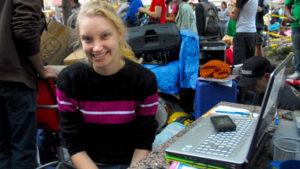
Each night, Breanna “Bre” Lembitz ’12 sleeps on a mat in New York’s Zuccotti Park, covered only by a tarp.
She can’t imagine sleeping anywhere else.
The political science and economics major has assumed a central role in the Occupy Wall Street movement, working 16- to 20-hour days to ensure that each financial contribution to the group is accounted for. Lembitz has resided in the park since the movement’s early days, and has been a popular interview subject on numerous media outlets including ABC News and National Public Radio.
Lembitz is taking the fall semester off from Clark to participate in the movement that supporters praise as a grassroots call for change and opponents deride as a frivolous distraction. She acknowledges that the message has been unfocused, but notes that the demand for such measures as universal health care, forgiveness of student loan obligations, and reduced economic disparity between the top 1 percent of wealthy Americans and the so-called “99-percenters” are “symptoms of the greater problem — a broken system.”
Lembitz was interviewed by CBC News in Canada about Occupy Wall Street. View the interview here.
Speaking by cell phone from Zuccotti Park, Lembitz says she doesn’t want the movement to be co-opted by any particular political party as the 2012 elections approach.
“This works because it is leaderless,” she says. “Imagine if someone just came and handed what they thought was the correct solution to your problem, or if instead they came to you and discussed and understood your issues and worked with you to reach a solution. That’s the difference. The way this movement works overrides a system that divides and marginalizes people. ”
Occupy Wall Street has spawned offshoot movements in cities across America (including Worcester) and overseas. According to Lembitz, each group is organized similarly, with ideas presented to and acted on by a general assembly. A proposal can be blocked if someone has a strong moral or ethical concern with the proposition.
Life in the park has not been a walk in it. While the police have generally left the protesters alone, Lembitz saw protesters arrested on the Brooklyn Bridge and has seen tear gas deployed. The nights are getting colder, and questions are being raised about how long the movement’s physical presence will last once the snow flies.
The protesters have shown some ingenuity. A thrift store has been set up in the park to supply basics. Lembitz says that when the activists were denied the use of a megaphone, they employed a communication method known as the “People’s Mic,” in which a speaker’s words are repeated among the crowd in waves, from front to back, so that everyone can receive the message.
Technology, including the use of social media, has been a driving force behind the movement’s ability to sustain its efforts and spread its message. Lembitz recalls that early in the protest donations of pizzas arrived at the park, most of them courtesy of supporters in Egypt. On the ground in New York, younger protesters who are generally more comfortable with the newer technologies oversee communications strategies, Lembitz says, while older participants have a hand in operating medical and food service stations, and helping shape the movement’s discussion points.
Structural issues within the movement concern Lembitz; she hopes they don’t weaken the effort. At the time of this interview she was working on a proposal to make the general assembly a more efficient vehicle for receiving ideas from the wider group.
Lembitz, who also speaks Spanish and Chinese, says she was initially attracted to the movement because she feels fortunate to have been born of privilege and believes others of lesser financial means should have access to the same opportunities. The prospect of political change inspired her to join Occupy Wall Street, but she now views the pressing issues as more economic-based.
Lembitz has encountered other Clarkies in the park over the past few weeks and encourages more to join her. She’s prepared to stay involved for the long haul.
“I’m in it heart and soul,” she says. “I’ll sleep in the cold as long as I physically can. I want to be here till the end.”


